Laxmikant Summary: National Commission to Review the Working of the Constitution- 1 | Indian Polity for UPSC CSE PDF Download
Introduction
The National Commission to Review the Working of the Constitution (NCRWC) was established through a resolution by the Government of India in the year 2000. The commission comprised 11 members and was led by M.N. Venkatachaliah, the former Chief Justice of India. It successfully submitted its report in the year 2002.
Terms of Reference
- As per the terms of reference, the National Commission to Review the Working of the Constitution (NCRWC), established in 2000, was mandated to assess the effectiveness of the existing provisions of the Constitution over the past fifty years.
- The commission, led by M.N. Venkatachaliah, the former Chief Justice of India, was tasked with recommending changes deemed necessary for the efficient functioning of governance and socio-economic development in modern India.
- Importantly, any suggested changes were to be within the framework of parliamentary democracy and without tampering with the 'basic structure' or 'basic features' of the Constitution.
- The commission made it clear that its role was a review of the Constitution's functioning, not a rewrite, and its recommendations were advisory. The acceptance or rejection of any proposals rested with the Parliament.
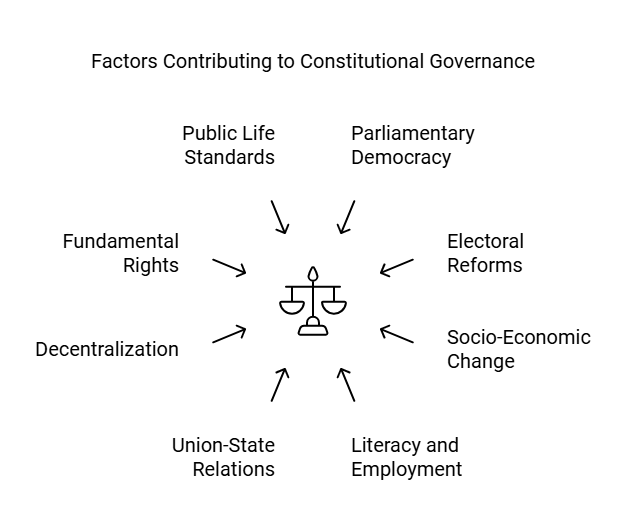
The commission independently identified eleven areas for study, which included:
- Strengthening parliamentary democracy institutions (Legislature, Executive, and Judiciary) and addressing issues of accountability, administrative challenges, and the social and economic costs of political instability.
- Electoral reforms and standards in political life.
- Socio-economic change and development under the Constitution, examining the assurance of social and economic rights in terms of fairness, speed, and equality.
- Promoting literacy, generating employment, ensuring social security, and poverty alleviation.
- Union-State relations.
- Decentralization, devolution, empowerment, and strengthening of Panchayati institutions.
- Enlargement of Fundamental Rights.
- Effectuation of Fundamental Duties.
- Effectuation of Directive Principles and achieving the Preambular objectives of the Constitution.
- Legal control of fiscal and monetary policies, and the public audit mechanism.
- Administrative system and standards in public life.
Areas of Concern
1. The government's neglect of the people, breaching the constitutional faith, has led to a loss of faith in governance. Citizens perceive Governments as besieged and institutions as ineffective, unable to cope with current events.
2. The Indian State's incapacity to anticipate and address global forces of change from scientific and technological developments is a significant concern.
3. Rising government costs and fiscal deficits are alarming trends that demand attention.
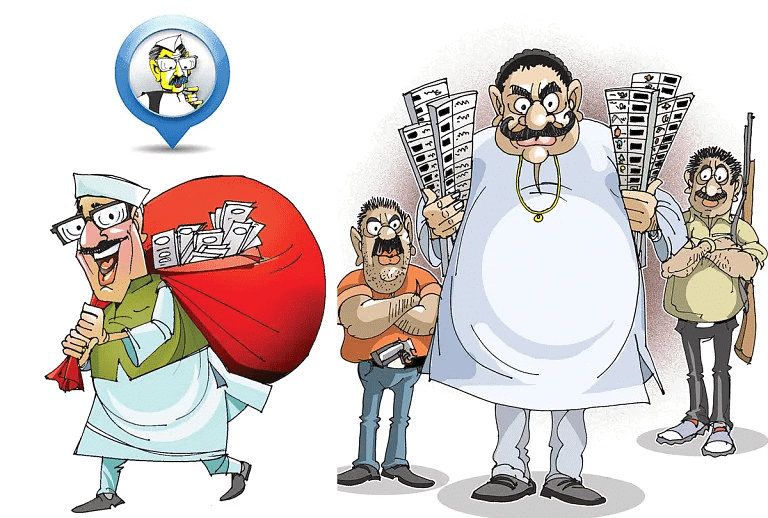
4. The political climate faces impurity with issues like the criminalization of politics, political corruption, and the politician-criminal-bureaucratic nexus requiring systemic changes.
5. National integrity and security issues lack adequate attention, with mechanisms for early warning signs of social unrest and disaster management being insufficient.
6. The working of parliamentary democratic institutions reveals serious fault lines, posing a threat to basic democratic values.
7. Misuse of the electoral process and the inability to prevent the entry of individuals with a criminal record into law-making institutions are areas of concern.
8. Parliament and State Legislatures lack adequate representative character due to inherent weaknesses in the electoral system.
9. Increasing instability of elected governments is attributed to opportunistic politics and unprincipled defections, with high economic and administrative costs.
10. The state of the Indian economy is disturbing, facing issues like a debt trap, corruption, and wasteful expenditure leading to parallel economies and governments.
11. Rural de-population, urbanization, urban congestion, and social unrest need immediate attention due to increasing unemployment.
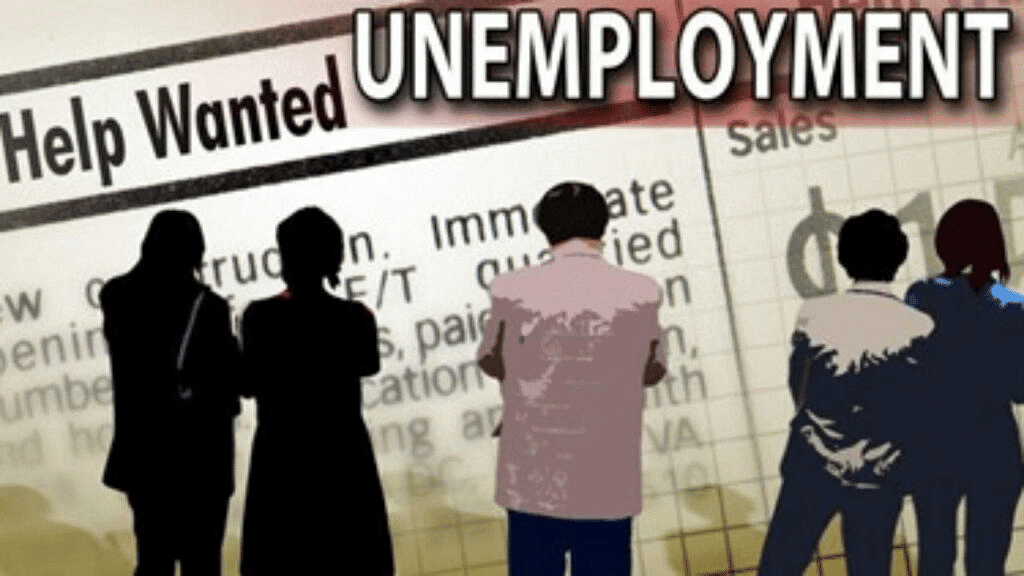
12. The future society, driven by knowledge, demands urgent repair in the quality of education and higher research.
13. The system of administration of justice is an area of concern, with the criminal justice system on the verge of collapse, delays in law, and high litigation costs.
14. Communal and inter-group riots need a holistic approach, treating them as manifestations of collective behavioural disorders rather than just a law and order issue.
15. Social infrastructure concerns include inadequate arrangements for the education, health, and well-being of 380 million children below the age of 14.
16. Health indicators, despite progress, remain at high and disconcerting levels, with infectious diseases witnessing an alarming increase.
Recommendations
In all, the commission made 249 recommendations. Of them:
- 58 recommendations involve amendments to the Constitution,
- 86 involve legislative initiatives,
- 105 could be accomplished through executive action.
1. On Fundamental Rights
- The scope of prohibition against discrimination (under Articles 15 and 16) should be extended to include 'ethnic or social origin, political or other opinion, property or birth'.
- The freedom of speech and expression (under Article 19) should be expanded to explicitly include 'the freedom of the press and other media, the freedom to hold opinions and to seek, receive and impart information and ideas'.
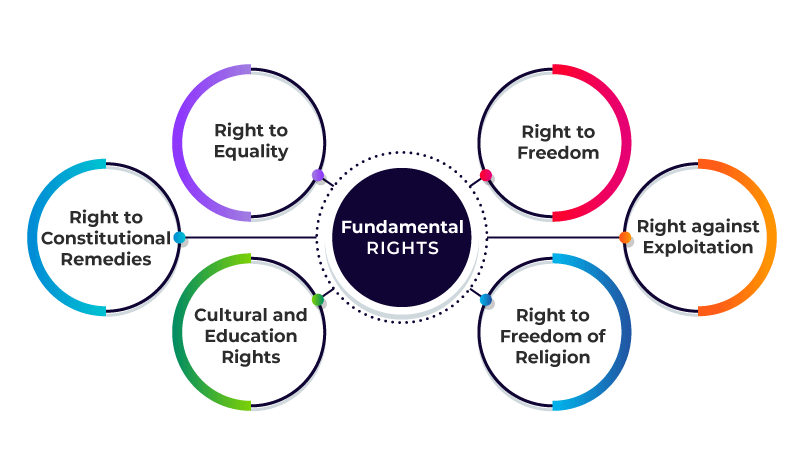
3. The following should be added as new Fundamental Rights:
(a) Right against torture, cruelty and inhuman treatment or punishment.
(b)Right to compensation if a person is illegally deprived of his/her right to life or liberty.
(c)Right to leave and to return to India.
(d)Right to privacy and family life
(e)Right to rural wage employment for a minimum of 80 days in a year.
(f)Right to access to courts and tribunals and speedy justice.
(g)Right to equal justice and free legal aid.
(h)Right to care and assistance and protection (in the case of children).
(i)Right to safe drinking water, prevention of pollution, conservation of ecology and sustainable development.
4. The right to education(under Article 21-A)should be enlarged to read as: 'Every child shall have the right to free education until he completes the age of fourteen years; and in the case of girls and members of the Scheduled Castes and Scheduled Tribes until they complete the age of eighteen years'.
5. Two changes should be made with respect to preventive detention (under Article 22), namely, (i) the maximum period of preventive detention should be six months, and (ii) the advisory board should consist of a chairman and two other members, and they should be serving judges of any high court.
6. Sikhism, Jainism, and Buddhism should be treated as religions separate from Hinduism, and the provisions grouping them together (under Article 25) should be deleted. At present, the word 'Hindu' is defined to include these religions also.
7. The protection from judicial review afforded by article 31-Bto the Acts and Regulations specified in the Ninth Schedule should be restricted to only those which relate to (i) agrarian reforms, (ii) reservations, and (iii) the implementation of Directive Principles specified in clause (b) or (e) of Article 39.
8. No suspension of the enforcement of the Fundamental Rights under Articles 17, 23, 24, 25, and 32 in addition to those under Articles 20 and 21 during the operation of a national emergency (under Article 352).
2. On Right to Property
 Article 300-A should be recast as follows:
Article 300-A should be recast as follows:1. Deprivation or acquisition of property shall be by authority of law and only for a public purpose.
2. There shall be no arbitrary deprivation or acquisition of property.
3. No deprivation or acquisition of agricultural, forest, and non-urban homestead land belonging to or customarily used by the Scheduled Castes (SCs) and Scheduled Tribes (STs) shall take place except by authority of law which provides for a suitable rehabilitation scheme before taking possession of such land. In brief, a right to 'suitable rehabilitation' for the SCs and STs if their land is to be acquired.
3. Directive Principles
1. The heading of Part-IV of the Constitution should be amended to read as 'Directive Principles of State Policy and Action'.2. A new Directive Principle control of population should be added.
3. An independent National Education Commission should be set up every five years.
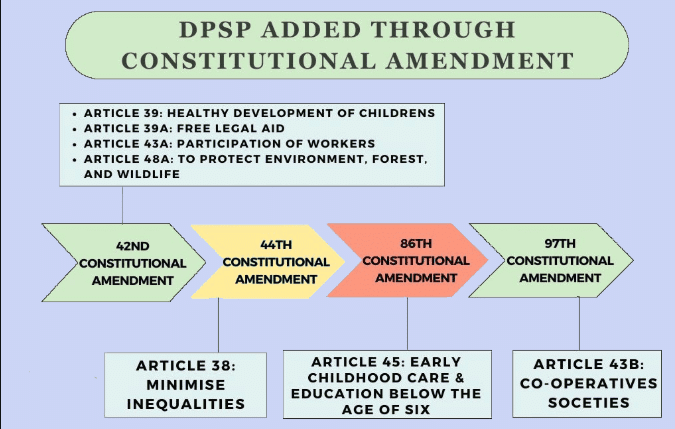
4. An Inter-Faith Commission should be established to promote inter-religious harmony and social solidarity.
5. There must be a body of high status to review the level of implementation of the Directive Principles.
6. A strategic Plan of Action should be initiated to create a large number of employment opportunities in five years.
7. Implementation of the recommendations contained in the Report of the National Statistical Commission (2001).
4. Fundamental Duties
1. Consideration should be given to the ways and means by which Fundamental Duties could be popularized and made effective.
2. The recommendations of the JusticeVerma Committee on the operationalisation of Fundamental Duties should be implemented at the earliest.
3. The following new fundamental duties should be included in Article 51-A:
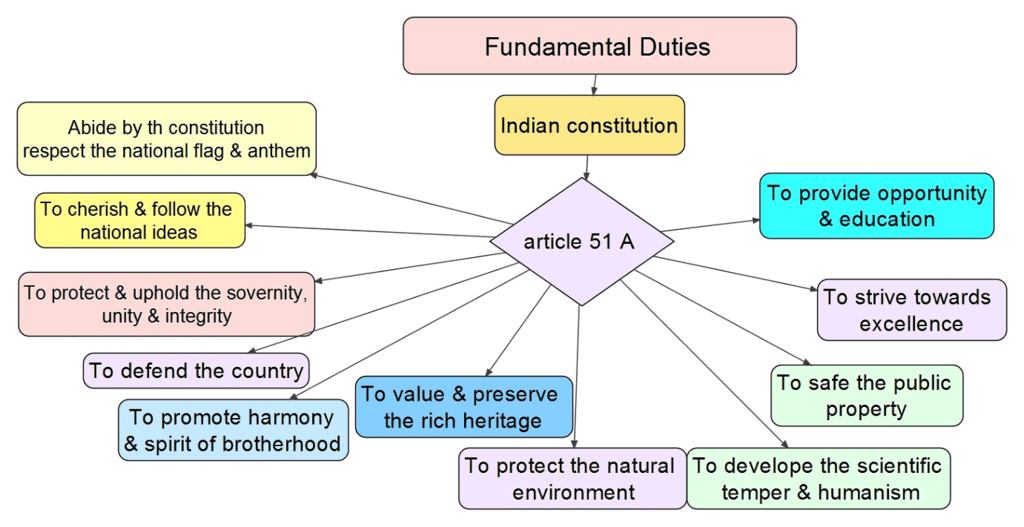
- Duty to vote at elections, actively participate in the democratic process of governance and to pay taxes.
- To foster a spirit of family values and responsible parenthood in the matter of education, and the physical and moral well-being of children.
- The duty of industrial organizations is to provide education to the children of their employees.
5. Parliament and State Legislatures
1. The privileges of legislators should be defined and delimited for the free and independent functioning of Parliament and state legislatures.
2. Article 105 may be amended to clarify that the immunity enjoyed by members under parliamentary privileges does not cover corrupt acts committed by them in connection with their duties in the House or otherwise. Further, no court would take cognizance of any offence arising out of a member's action in the House without prior sanction of the Speaker/Chairman. Article 194 may also be similarly amended in relation to the members of state legislatures.
3, The domiciliary requirement for eligibility to contest elections to Rajya Sabha from the concerned state should be maintained. This is essential to ensure the federal character of the Rajya Sabha.
4. The MP local area development scheme should be discontinued.
5. The Election Commission should be empowered to identify and declare the various offices under the central and state governments to be 'offices of profit' for the purposes of being chosen, and for being, a member of the appropriate legislature.
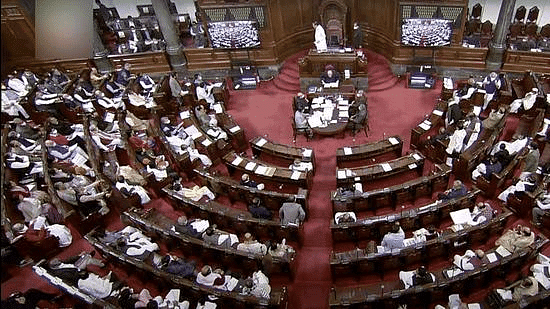
6. Immediate steps be taken to set up a Nodal Standing Committee on National Economy.
7. A Standing Constitution Committee of the two Houses of Parliament for a priori scrutiny of constitutional amendment proposals should be set up.
8. A new Legislation Committee of Parliament to oversee and coordinate legislative planning should be constituted.
9. The existing Parliamentary Committees on Estimates, Public Undertakings, and Subordinate Legislation may not be continued.
10. The Parliamentarians must voluntarily place themselves open to public scrutiny through a parliamentary ombudsman.
11. The State Legislatures with less than 70 members should meet for at least 50 days in a year and other State Legislatures for at least 90 days. Similarly, the minimum number of days for sittings of Rajya Sabha and Lok Sabha should be fixed at 100 and 120 days respectively.
12. A Study Group outside Parliament for the study of procedural reforms should be set up.
|
142 videos|779 docs|202 tests
|
FAQs on Laxmikant Summary: National Commission to Review the Working of the Constitution- 1 - Indian Polity for UPSC CSE
| 1. What was the main purpose of the National Commission to Review the Working of the Constitution? |  |
| 2. Who constituted the National Commission to Review the Working of the Constitution? |  |
| 3. What were some key areas of concern identified by the National Commission? |  |
| 4. What recommendations did the National Commission make regarding the electoral process? |  |
| 5. How did the National Commission propose to address the relationship between the Centre and the states? |  |
















